
Cary Grant was an English and American actor. Known for his Mid-Atlantic accent, debonair demeanor, lighthearted approach to acting, and sense of comic timing, he was one of classic Hollywood's definitive leading men. He was nominated twice for the Academy Award, received an Academy Honorary Award in 1970, and received the Kennedy Center Honor in 1981. He was named the second greatest male star of the Golden Age of Hollywood by the American Film Institute in 1999.

Charles Laughton was a British and American actor. He was trained in London at the Royal Academy of Dramatic Art and first appeared professionally on the stage in 1926. In 1927, he was cast in a play with his future wife Elsa Lanchester, with whom he lived and worked until his death.

The Night of the Hunter is a 1955 American thriller film noir directed by Charles Laughton and starring Robert Mitchum, Shelley Winters and Lillian Gish. The screenplay by James Agee was based on the 1953 novel of the same name by Davis Grubb. The plot involves Harry Powell (Mitchum), a serial killer who poses as a preacher and pursues two children in an attempt to get his hands on $10,000 of stolen cash hidden by their late father.
The following is an overview of 1932 in film, including significant events, a list of films released and notable births and deaths.
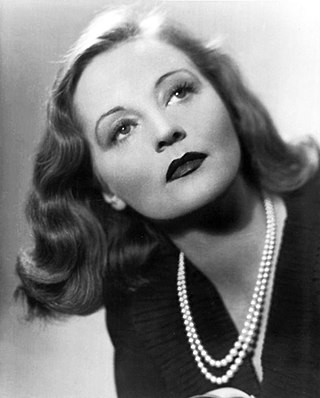
Tallulah Brockman Bankhead was an American actress. Primarily an actress of the stage, Bankhead also appeared in several films including an award-winning performance in Alfred Hitchcock's Lifeboat (1944). She also had a brief but successful career on radio and made appearances on television. In all, Bankhead amassed nearly 300 film, stage, television and radio roles during her career. She was inducted into the American Theater Hall of Fame in 1972 and the Alabama Women's Hall of Fame in 1981.

Richard Jaeckel was an American actor of film and television. Jaeckel became a well-known character actor in his career, which spanned six decades. He received an Academy Award nomination for Best Supporting Actor with his role in the 1971 adaptation of Ken Kesey's Sometimes a Great Notion.

Operation Petticoat is a 1959 American World War II submarine comedy film in Eastmancolor from Universal-International, produced by Robert Arthur, directed by Blake Edwards, and starring Cary Grant and Tony Curtis.

Destination Tokyo is a 1943 black and white American submarine war film. The film was directed by Delmer Daves in his directorial debut, and the screenplay was written by Daves and Albert Maltz, based on an original story by former submariner Steve Fisher. The film stars Cary Grant and John Garfield and features Dane Clark, Robert Hutton, and Warner Anderson, along with John Ridgely, Alan Hale Sr. and William Prince.
The House That Shadows Built (1931) is a feature compilation film from Paramount Pictures, made to celebrate the 20th anniversary of the studio's founding in 1912. The film was a promotional film for exhibitors and never had a regular theatrical release.

This Is the Night is a 1932 American pre-Code comedy film directed by Frank Tuttle, and starring Lili Damita, Charles Ruggles, Roland Young, Thelma Todd, and Cary Grant in his film debut. It was made by Paramount Pictures.

The Last Outpost is a 1935 American adventure film directed by Charles Barton and Louis J. Gasnier and written by Charles Brackett, Frank Partos and Philip MacDonald. It is based on F. Britten Austin's novel The Drum. The film stars Cary Grant, Claude Rains, Gertrude Michael, Kathleen Burke, Colin Tapley, Margaret Swope and Billy Bevan. The film was released on October 11, 1935, by Paramount Pictures.

You're in the Navy Now is a 1951 American war-comedy film about the United States Navy in the first months of World War II. The film was directed by Henry Hathaway and stars Gary Cooper as a new officer wanting duty at sea but who is instead assigned to an experimental project without much hope of success. It was released by 20th Century Fox and its initial release was titled U.S.S. Teakettle. When the film failed to gain an audience, it was re-titled to the present title.
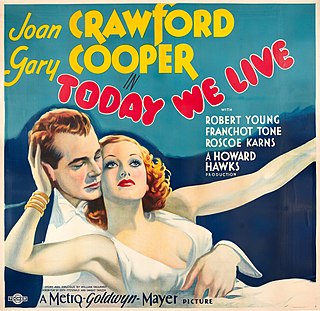
Today We Live is a 1933 American pre-Code romance drama film produced and directed by Howard Hawks and starring Joan Crawford, Gary Cooper, Robert Young and Franchot Tone.
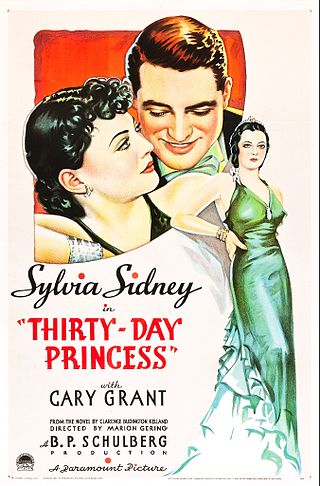
Thirty Day Princess is a 1934 pre-Code comedy film directed by Marion Gering and starring Sylvia Sidney, Cary Grant and Edward Arnold. The film was based on a story of the same name by Clarence Budington Kelland, adapted by Sam Hellman and Edwin Justus Mayer, and written by Preston Sturges and Frank Partos.

A Royal Scandal, also known as Czarina, is a 1945 American comedy-drama film directed by Otto Preminger, produced by Ernst Lubitsch. about the lovelife of Russian empress Catherine the Great. It stars Tallulah Bankhead, Charles Coburn, Anne Baxter and William Eythe. The film was based on the play Die Zarin by Lajos Bíró and Melchior Lengyel.
Hollywood on Parade (1932–1934) is a series of short subjects released by Paramount Pictures.

Lady Sings the Blues (1956) is an autobiography by jazz singer Billie Holiday, which was co-authored by William Dufty. The book formed the basis of the 1972 film Lady Sings the Blues starring Diana Ross.
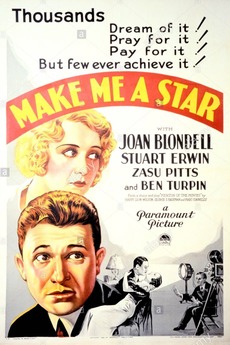
Make Me a Star is a 1932 American pre-Code romantic comedy film starring Stuart Erwin, Joan Blondell, and ZaSu Pitts. Directed by William Beaudine, the film is a remake of the 1924 silent film Merton of the Movies, based upon the 1922 novel of that name, and the 1923 play adapted from the novel by George S. Kaufman, and Marc Connelly. It was remade again as Merton of the Movies in 1947.
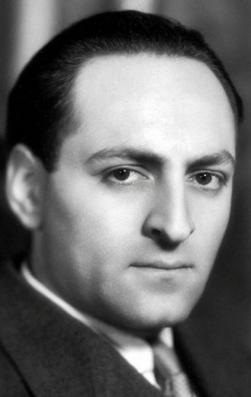
Marion Gering was a Russian-born American stage producer and director. He moved to the United States in 1923 as an artist. He became involved in the theatrical community in Chicago, founding the Chicago Play Producing Company.

















